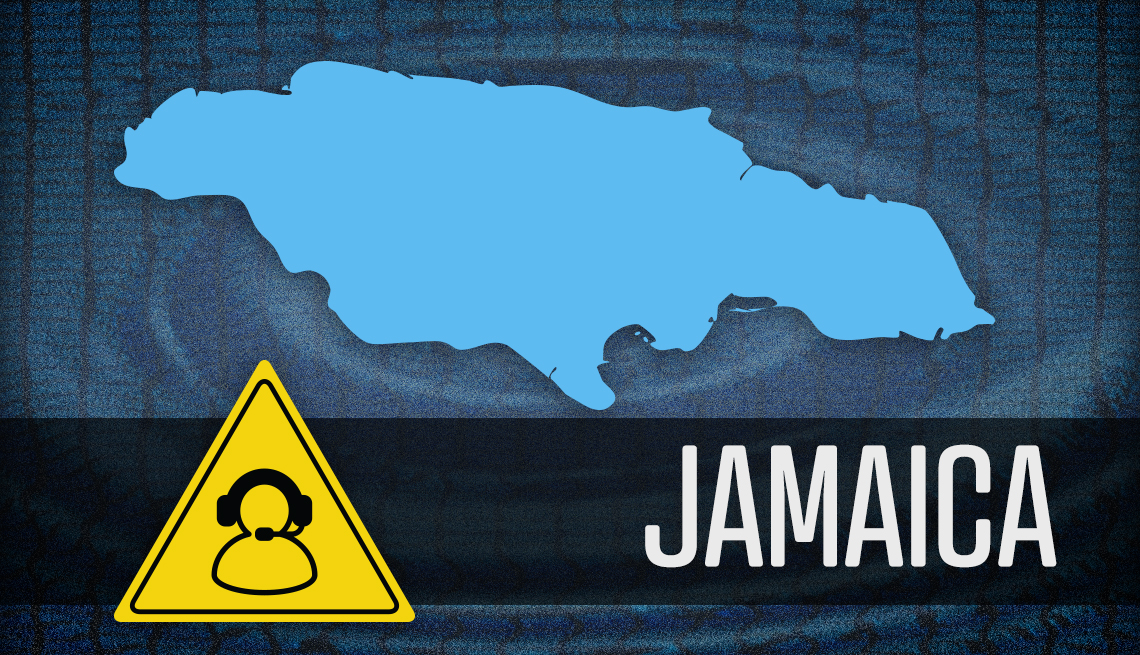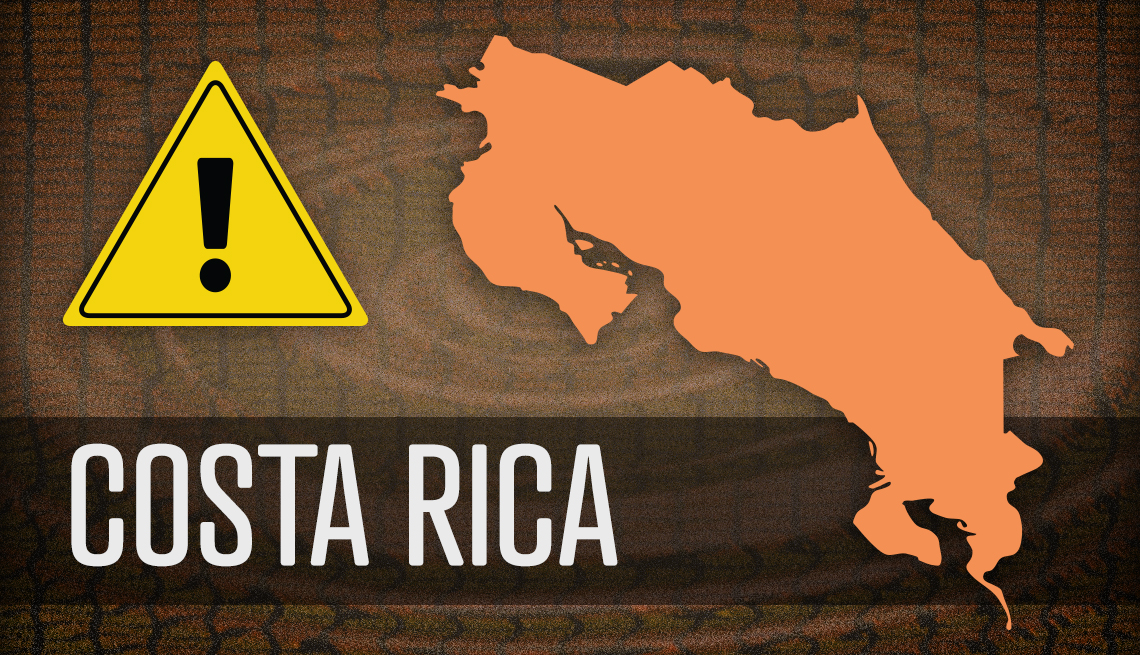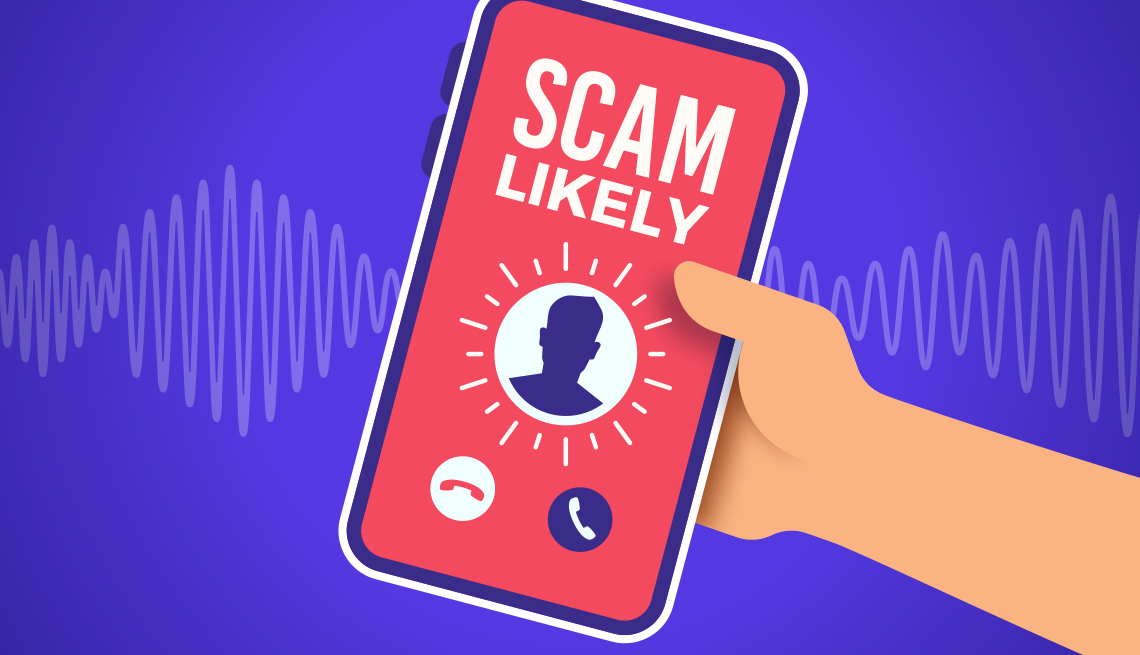How International Fraud Rings Operate and Target Older Americans
From phone and email scams to imposter fraud, see how they operate
En español | They called it the “office,” and by all reports, it was a bustling place. The converted house in Jamaica was filled with workers at desks and phones. There were payroll sheets to track transactions made and commissions paid. Each day, a room manager passed out lists of people to call. A whiteboard tracked how the “salesmen” — and they were called salesmen — were performing. At the end of the day, a janitor came in to clean up.
It would have been easy to assume this was a well-run professional business. In many ways it was — except the business was fraud. The many “salesmen” were actually pretending to be government officials as they called older Americans to tell them that they'd won a lottery prize worth millions, but only if they'd hand over thousands of dollars in “taxes” and “fees.” Of course there were no winnings to come.
Many people still think of fraud as the playground of small-time hustlers. We've seen movies about con men: The Grifters, The Talented Mr. Ripley, Catch Me If You Can. These characters are lone wolves, or at most they assemble a small team to pull off that one big heist, Ocean's Eleven- style. But the truth is far different. An AARP Bulletin investigation — including interviews with dozens of experts and an examination of thousands of pages of court documents — shows just how systematic this “industry” has become, with fraud operations functioning in much the same manner as legitimate businesses establishing work spaces, purchasing leads, employing staff, setting goals, monitoring results and deploying the latest in technology all in an effort to steal your money. So when you answer that phone call about a prize for a contest you don't remember entering, or patiently listen to a pitch about a can't-miss investment opportunity, remember that behind that caller is very likely a sophisticated, professional enterprise.
And they're part of a big international industry. Older Americans lose roughly $3 billion to fraud each year, the U.S. Senate Special Committee on Aging reported in 2019. Scammers from around the world tend to target older Americans in particular because they have wealth, tend to be trusting and may be less sophisticated about technology.
"In the U.S., we have a target-rich environment; the majority of baby boomers are retirement age,” says Bill Brown, unit chief of the FBI financial crimes section. “These assets will be the shiny new object for any criminal enterprise.”
For $600, would-be criminals can take an online course in identify theft.
Last month, Attorney General William Barr announced that in the past year, more than 400 people have been charged with fraud against older Americans. Included were alleged scammers from Peru, who were targeting Spanish-speaking Americans by threatening arrest or deportation if they didn't pay a nonexistent bill, and Singapore, where a man was accused of impersonating an Internal Revenue Service agent to con people into sending money.
Technology is also the fraudster's friend; today, data flows easily, and many international lines of communication like emails and phone calls have become cheap and pervasive. Scammers also share their tactics online. Brett Johnson — a cybersecurity consultant who formerly led ShadowCrew, one of the first online sites for cybercrime — says online classes on how to steal identities are offered for $600.
This has all turned fraud into a global concern, often driven by a lack of employment opportunity in developing countries and a lack of concern about the victims. “The basic belief is that the people they are scamming have a lot of money and can afford it,” says Nick Chase, a prosecutor in North Dakota who has helped convict multiple scammers. “They tell themselves, ‘What I'm doing isn't so bad.’ “
Says Jim Weidner, a lawyer in North Carolina who has defended several people from Jamaica accused of lottery fraud in the U.S.: “Their mindset is, this is just a business. They do not consider it crime, although they know it is against the law."
Interestingly, the practice of American companies outsourcing work overseas, where wages are lower, has unwittingly built up the fraud industry. Call centers for the Caribbean tourism industry and in places like India have trained workers how to communicate with U.S. consumers, and some go on to use those skills at illegal call centers. There, crime breeds crime. Law enforcement officials attributed Jamaica's high murder rate in 2017 — about twice that of Chicago's — at least in part to rival gangs stealing fraud leads from each other, according to Steve Baker, the former Midwest Region director of the Federal Trade Commission (FTC), who conducted a 2018 study for the Better Business Bureau.
In some cases, the fraud operations are multinational. Two Nigerian-born alleged conspirators in a romance scam — in which impostors woo victims on matchmaking apps and social media — lived in the United States but helped launder money using bank accounts in other countries. Many of their coconspirators were in Nigeria, and through the scam they could make about $28,000 in three years — or almost $800 per month, according to a New York Times report. Compare that with $28 to $42 in monthly pay in Nigeria for an administrative position or a job pressing shirts.
Inside a fraud business
The benefits of creating a professional fraud organization start with mathematics: More pitches equal more successful “conversions” — to use the parlance of sales — and that equals more money. Scale also allows for specialization. For each person making a call, there can be additional workers behind the scenes who handle narrower tasks, such as securing names of targets, running the computers and technology, collecting and laundering money, and managing everything to make it all work together.
Common Fraud Jobs
Lead Broker
Sells lists of potential victims, their phone numbers and other personal information to their own net-work of buyers, whether they are legitimate companies, fraud enterprises or both.
Salesmen
Talk to victims, often after they have answered a robocall. Some organizations employ “openers,” who scam victims first, and “loaders,” who try to increase the amount of money sent.
Managers
Run the call center or the larger operation. In turn, they take a cut of all “revenue.” In one case, the ringleaders’ portion was 20 percent, after lower-level workers got their cuts.
Mules
Transport money taken from victims to the organization. When they are recruited, some may not know they are work-ing for a criminal enterprise, but the FBI says it is a crime, regardless.
Hackers
Expert computer coders who steal consumer information from businesses and online services. They may use the information to commit other crimes or resell it on the dark web.
Bigger scam operators may keep these operations separate, so that few participants know the full scale of what's happening; a recent report in the AARP Bulletin focused on a man who went to prison for laundering money for a fraud operation even though he had no idea what it did and had only ever communicated with a single nameless boss. But even smaller-scale fraud operations are well coordinated. “You work with maybe 10 or 15 people that you know and trust,” says security consultant Johnson. “Think of it as a loose cooperative, where people come in and out, depending on the project."
And just as in the business world, some of the tasks of fraud can be outsourced. For example, there are fraud businesses that simply collect and sell private information for scammers to exploit. “List brokers” are common in legitimate businesses; sales teams find value in qualified leads — for example, people who have expressed an interest in purchasing a new car by creating an account on a website that compares auto prices, or maybe people who have a car that is a few years old and could be a prime target for an upgrade.
The key difference here is that the people on the lists that fraud operations purchase usually have a propensity to give out information. Of particular value are what are known as “sucker” lists or “slips.” These are people who responded to an offer, perhaps a nonexistent sweepstakes, by providing all of their information — name, address, phone number and even Social Security number. That contact information can be sold to scammers all over the globe for as much as $5.50 per person.
A multilayer setup also insulates the people at the top, not unlike the way other organized crime syndicates work. “The top-tier scammers mostly operate through foot soldiers, and they don't get their hands dirty,” says Kevin Watson, the former head of the Jamaican police's Anti-Lottery Scam Task Force (he now works as a fraud investigator for a bank in Canada). Kingpins can often be difficult to identify.
Take the case of Lavrick Willocks. This Jamaican man was sentenced in 2018 to six years in prison for his role in a lottery scam that bilked more than 100 mostly older Americans across 31 states out of more than $6 million. His mother, Dahlia Hunter, was also charged. The case was billed as the first major prosecution of a lottery kingpin.
Willocks pleaded guilty, but he also accused U.S. prosecutors of overstating his involvement. “The government tries to portray me as a mastermind,” he said. “If I hadn't been involved, it wouldn't have stopped anything."
Willocks was drawn into the fraud game by a man named Alrick McLeod — also known as Birdman or Z-Bird — who would host parties attended by coconspirators. Some suspect that McLeod was the actual kingpin; he pleaded guilty to fraud charges in 2017.
Yet Jamaican lottery scams continue to thrive. The court affidavit noted that people who once worked with Willocks “branched off to form their own lottery scam criminal organizations,” although McLeod and Willocks continued to work together. Three other defendants in that case were later apprehended.
“Sometimes we are chasing a ghost. You catch one and another one pops up to take its place.”
How organizations spread
Just as in legitimate businesses, there's an apprenticeship aspect to fraud. The inexperienced learn at the feet of their mentors and then break off to start their own businesses. This is how two men named Arash Ketabchi and William Sinclair most likely learned their trade. They were both employees of something called the Manhattan Professional Group, or the Tax Club, which essentially was an opportunity scheme, promising victims that they would learn how to run successful home-based businesses. The Tax Club bilked its victims of more than $200 million, according to the FTC, which filed an enforcement action against it in 2013.
The Tax Club was later shut down, but Ketabchi, Sinclair and others had already launched their own enterprise. They'd persuade mostly older people to invest in, say, an online marketing company, and then they'd perform a bare minimum of work to create documentation that appeared to support the credit card charges. Of course, the promised riches never appeared. Ketabchi alone got hundreds of thousands of dollars from victims, according to New York City police.
Sometimes these associations turn sour, and this illustrates another way that fraud operations act like businesses. They sue each other. An example:
In 2018, the FTC filed complaints against two companies with remarkably similar business models — both versions of the business opportunity scheme. The first one, called Digital Altitude, was run by a man named Michael Force, who advertised himself as a “former Marine turned millionaire.” It promised customers riches — “six figures online in the next 90 days or less!” The FTC alleged that Force's scheme bilked victims out of at least $54 million.
The second company, cited a few months later, was called MOBE (My Online Business Education), which promoted a “proven” 21-step system for starting a money-making online business. It targeted older Americans and veterans and, according to the FTC, bilked them out of about $318 million; some individuals lost more than $20,000. MOBE was started by Matthew Lloyd McPhee, an Australian who lived in Kuala Lumpur, Malaysia, and had employed Force previously.
Two years earlier, in 2016, MOBE sued Digital Altitude — yes, public documents were filed! — alleging that it copied MOBE's material. The parties settled for an undisclosed amount in October 2017, before being shut down by the FTC.
Even then, other associates may scatter, set up shop and perpetuate the frauds.
"We may get the principals, but we don't get every distributor,” says Lois Greisman, who oversees the FTC's marketing practices division. “They take the skills from company A and create company B.”
Says Amy Nofziger, director of the AARP Fraud Watch Network helpline: “Sometimes we are chasing a ghost. You catch one and another one pops up to take its place.”
Catching the go-betweens
Some people who do get caught are the “mules,” fraud workers who simply transport money or play other intermediary roles in scams. In the fall of 2019, the Department of Justice announced a “landmark money mule initiative,” aimed at stopping such activity.
U.S. law enforcement has stopped more than 600 mules and charged more than 30 with crimes. “I used to think they were small fish and we shouldn't bother with them,” says Chase, the North Dakota prosecutor involved in the Willocks case. “But now I think it's necessary to prosecute them. They know the perpetrators extensively, and the mule, who is often in America, is the person you can get your hands on.”
Take the case of American Melinda Bulgin, convicted in 2018 as a coconspirator in the Willocks case. She had been transporting money from victims in the U.S. to scammers in Jamaica; working in customer service for an airline enabled her to book inexpensive flights. She also was involved in obtaining checks, money orders and wire transfers from victims, and in total conspired to defraud people of about $330,000.
A boyfriend recruited her into the scam, she testified: “I was twisted; I thought I was in love.” Says Mark Solomon, a detective in the Greenwich Police Department in Connecticut who specializes in elder fraud, “They may get involved due to promises of love or companionship, or offers of legitimate employment, or by intimidation, fear, threats, promises of good fortunes or other vices,” he says. “And then they can't get out.” In 2015, Bulgin was stopped at an airport by Jamaican customs authorities. She was in possession of $14,800 in cash.
But focusing on mules can prove tricky. Many fraud organizations use specific mules for limited times, to insulate those running the organization. And scammers are evolving. Baker notes that a new tactic is to employ people to open bank accounts and have victims send money to those accounts, minimizing the need to physically transport money.
"All the victims, to a person, think they are stupid. And all the perpetrators, to a person, think they are really smart ... But this is never a story of dumb versus smart. This is always a story of a trusting person, and a person who is willing to violate that trust.”
Protecting yourself
Less risk for a fraud business usually translates to more risk for the rest of us, as it gets safer and easier for scammers to make their pitches. While the law enforcers we talked with for this report are proud of their work, they acknowledge that the risk to older Americans remains very real. Fraud organizations are sophisticated and difficult to stop.
The takeaway message: If you do respond to that robocall and get connected to a real person, you have initiated a struggle between one (you) and many (the scammers). They are armed and expert at winning you over, using what-ever psychological means necessary to get your money.
The best advice is what you have heard numerous times: Don't answer calls from numbers you don't know. If you do, be sure to hang up the moment that you realize it's a robocall. Don't say anything. Be skeptical of any offer that sounds too good to be true. Never agree to a proposition involving your money without doing research. If you do happen to fall for a scam, report it to authorities immediately. But importantly, don't beat yourself up.
6 Hotspots for Fraud
- |
- Photos










